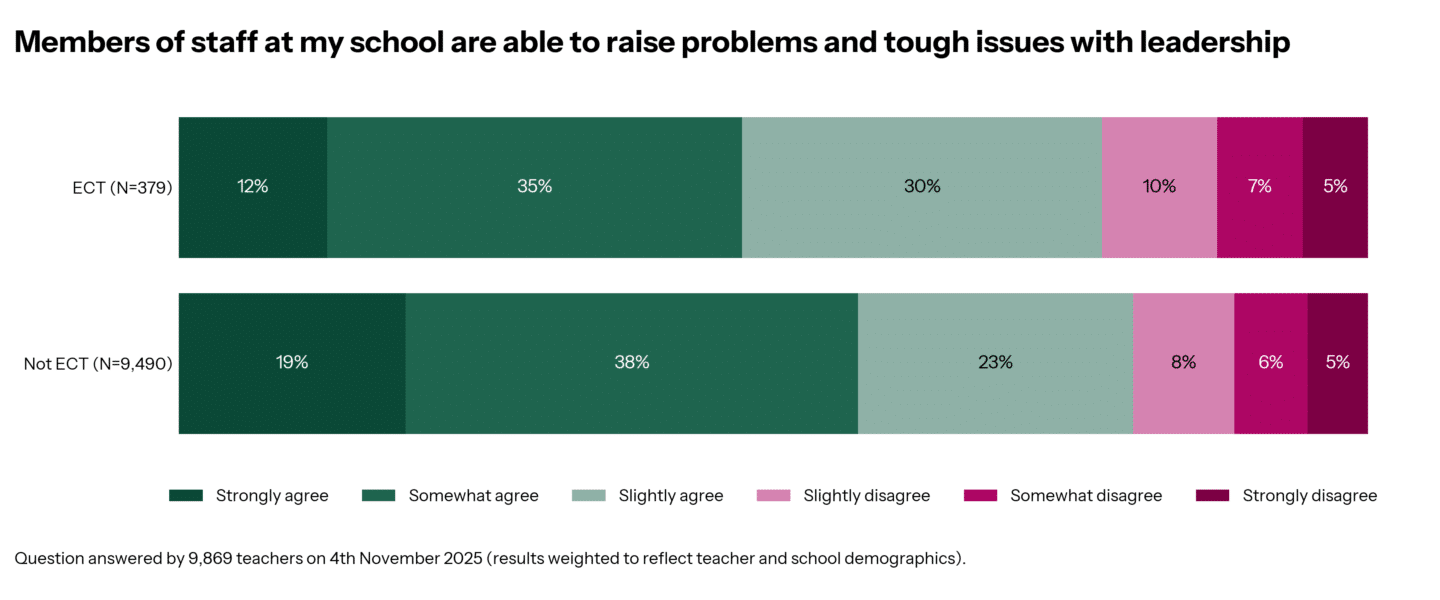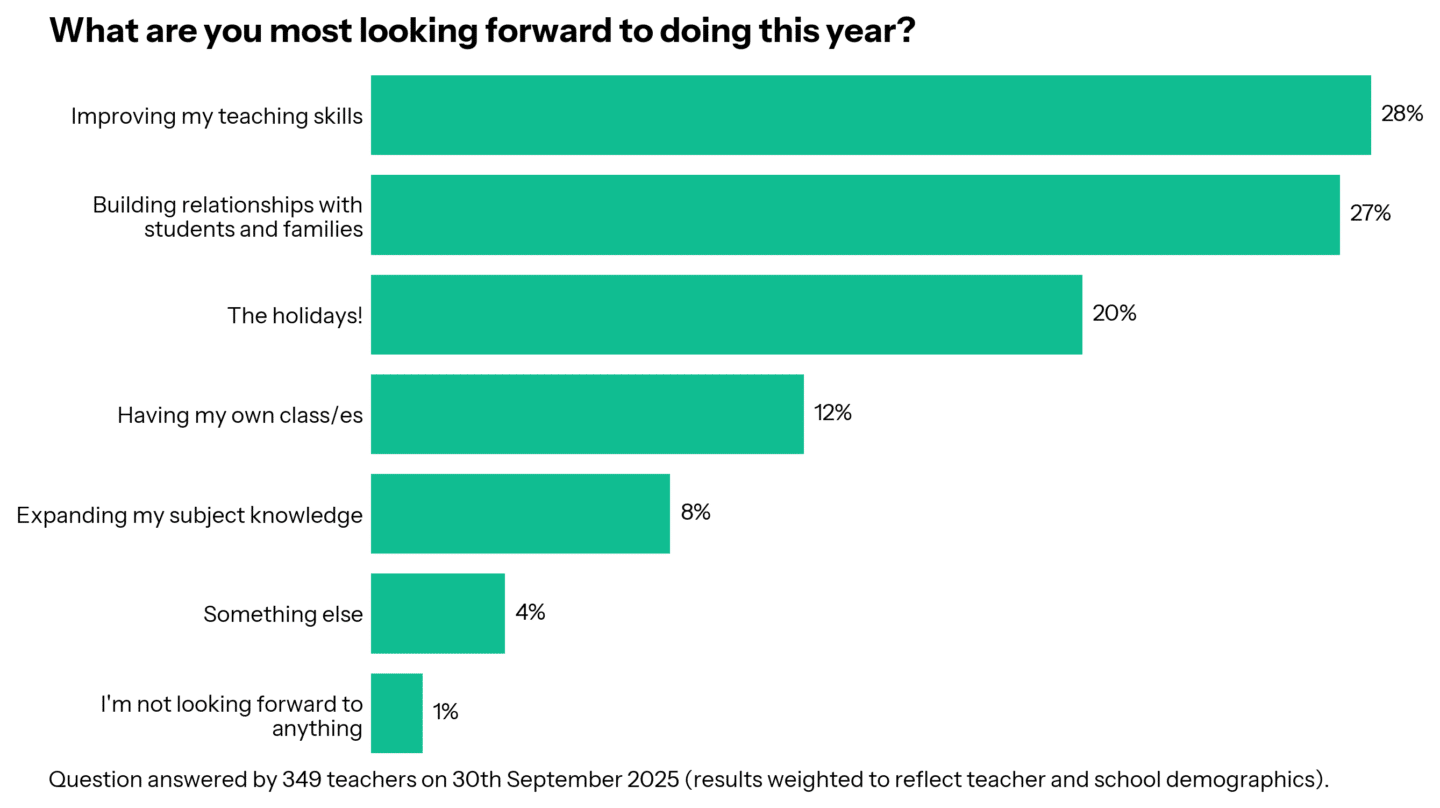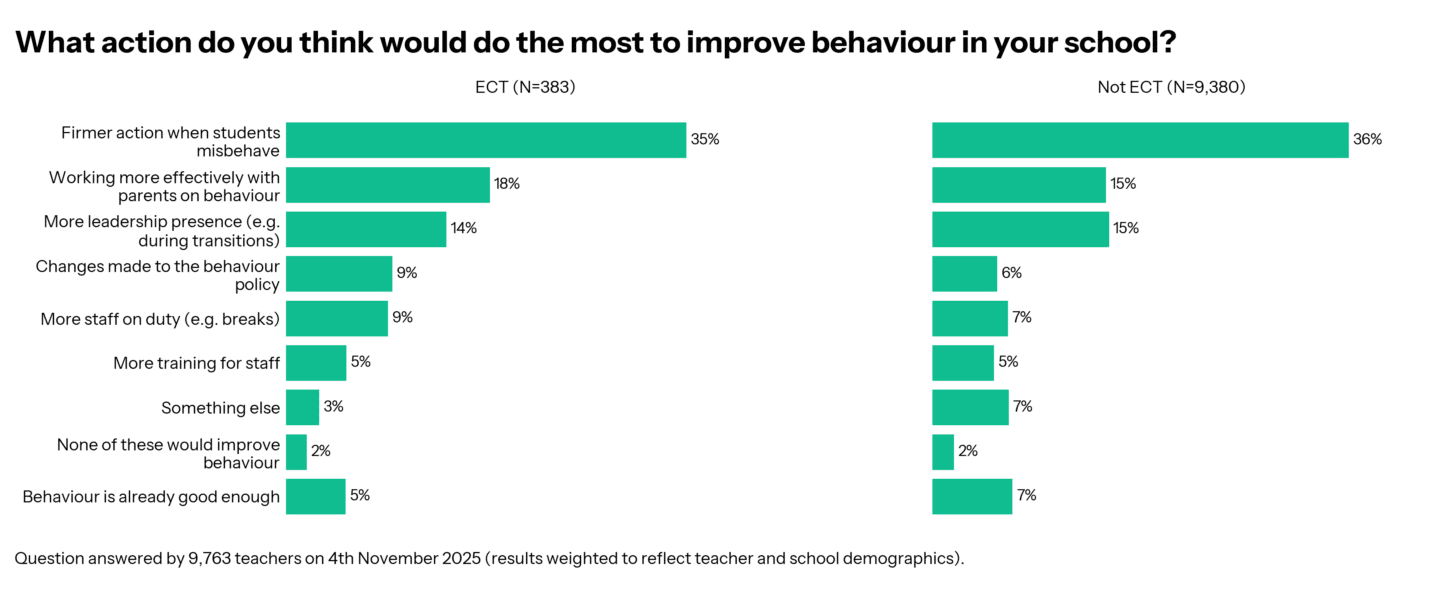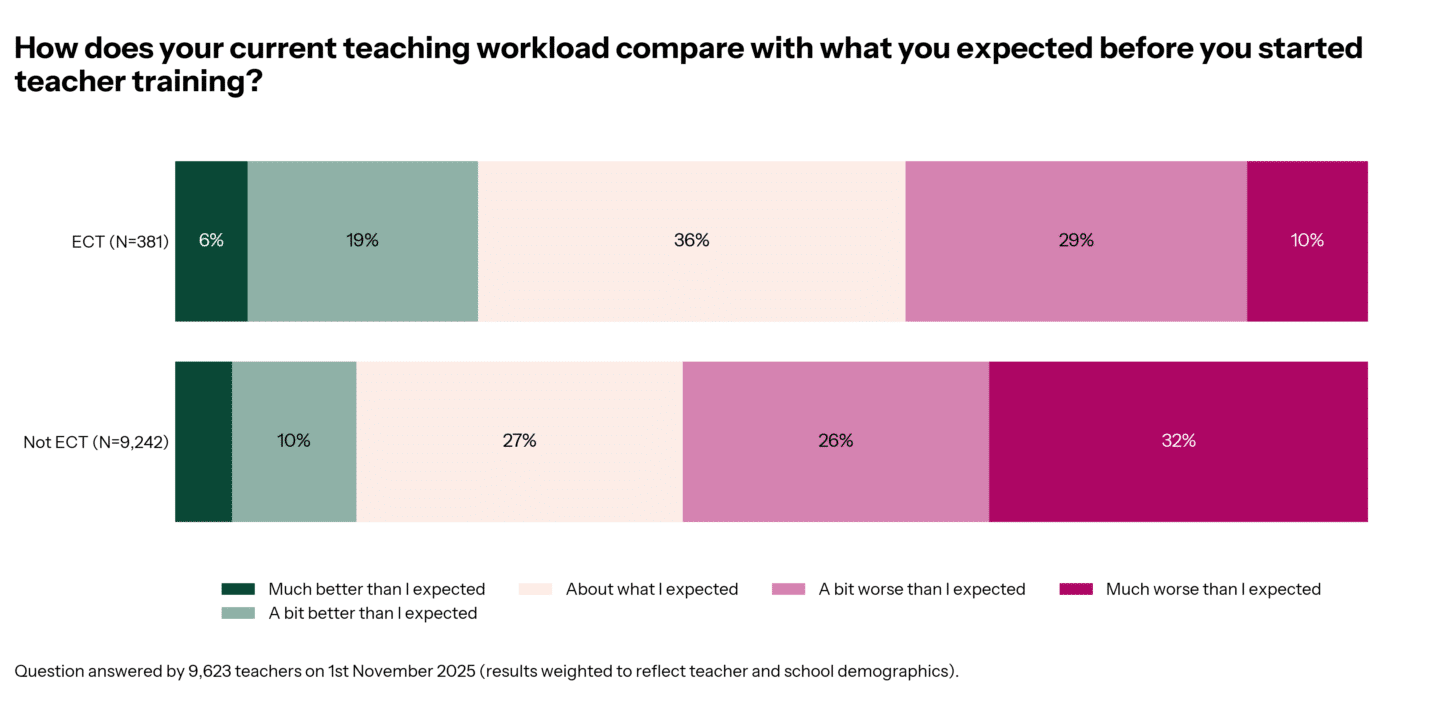
The first half term is done — and for Early Career Teachers, that’s no small achievement!
At Teacher Tapp, we’ve been following their journey: the hopes, the challenges, and how schools are supporting them along the way.
Here’s what the data tells us about how ECTs are really getting on — and what school leaders might want to reflect on.
1. Expectations vs Reality
Before the year began, 42% of ECTs expected behaviour to be the toughest part of the job.

A few weeks in, that prediction proved correct — behaviour remained the top cause of stress (20%).
However, once term started, other challenges also loomed larger than expected.
- Pastoral issues (e.g. safeguarding, student wellbeing) and admin tasks rose sharply as stressors.
- Marking and planning also proved tougher in practice (11% and 10% reported it had caused them stress)
- Only 2% of ECTs said they hadn’t felt stressed at all.

However, facing challenges are to be expected (after all, if teaching was an easy job, there wouldn’t be any issue recruiting teachers!). So perhaps it’s more important to check ECTs feel confident speaking up about the problems they face.
In this respect, it isn’t good news. ECTs are less likely to feel they can raise problems with leaders (12% “strongly agree” vs 19% of experienced staff).

💡 What leaders can do
- Encourage ECTs to speak up if something feels wrong – ECTs may hesitate to raise concerns if they fear judgment.
- Create open channels of communication between leadership and teaching staff – make it easy for staff to approach leaders with problems.
- Keep an eye on student behaviour around ECTs – are newer teachers given back up where they need it?
2. Mentoring matters
The mentor-ECT relationship is an important one. They have to be the person the ECT turns to when things get tough, while also being the one to implement tough love if work isn’t up to scratch. But how ideal are the mentor-ECT pairings? In secondary, 27% of ECTs reported their mentor did not share their subject specialism, and looking at both phases, 29% of mentors had more than one ECT to look after.
When it comes to mentor meetings, the inconsistencies continue. The entitlement to regular mentor meetings is one of the cornerstones of the ECF, but implementation varies. Finding a space where you won’t be overheard appears to be a struggle, with 59% of ECTs having meetings with their mentors in spaces where other colleagues can listen in.
Just holding the meeting can be a challenge with 62% have had a mentor meeting or observation cancelled and not rearranged, and just 10% get to have a room booked for their meeting.
It’s worth checking how reliable and private your mentoring structure feels from the ECT’s perspective.
A quiet room and a protected slot might sound small — but they send a powerful message: this time matters.
💡 What leaders can do
- Protect mentor meeting time as sacrosanct, and ensure it’s recorded on timetables for both parties.
- Provide a private space — even a quiet corner — where ECTs can speak openly without fear of being overheard.
- Encourage mentors to treat sessions as reflective coaching, not just administrative catch-ups.
3. What motivates ECTs
Onto some more positive news, we dug into what motivated ECTs, and the findings suggested an enthusiastic crop of teachers. Almost every ECT (99%) said they had things they were looking forward to this year – most often improving their teaching (28%) and building relationships (27%).

Their enthusiasm is genuine, but it cannot be forgotten that they’re managing steeper behaviour challenges. Extra visibility, coaching, and calm reassurance from senior staff can make a huge difference.
The daily classroom picture shows why many find the early months exhausting: twice as many ECTs as non-ECTs reported that half or more of their class misbehaved in their last lesson (18% vs 8%). Not only is behaviour in class poor, but so is compliance: only 19% of ECTs said most or all students completed their last homework, compared with 25% of non-ECTs.
💡 What leaders can do
- Make sure ECTs know they’re not alone when dealing with behaviour — visible senior presence and swift follow-up on incidents go a long way.
- Encourage staff to share strategies and successes, not just challenges.
- Recognise that a calm “drop-in and debrief” from a trusted leader can rebuild confidence after a tough lesson.
4. What ECTs need to manage behaviour
When asked how behaviour could be improved, ECTs and experienced teachers agreed on one key point:
👉 Firmer action when students misbehave tops the list for both groups.
But ECTs also showed a stronger desire for visible and joined-up support, especially compared to non-ECTs. Working more effectively with parents was chosen more by ECTs than non-ECTs (18% vs 15%) as was adjustments to the behaviour policy (9% vs 6%). A significant proportion of both ECTs and non-ECTs also felt that more leadership presence during transitions (14% and 15%) would help behaviour.
This points to a need for clear systems, visible leadership, and collective consistency — helping ECTs feel they’re not tackling behaviour alone.

💡 What leaders can do
- Be visible during key parts of the day — corridors, transitions, and ends of lessons.
- Reinforce the message that behaviour is a shared responsibility, not a test of an ECT’s authority.
- Offer joint parent meetings when behaviour concerns arise, so ECTs see effective home-school partnership in action.
5. Are ECTs prepared?
Are ECTs prepared for life in the classroom? The good news is that for the majority, the answer appears to be ‘yes’. When we asked teachers how their current workload matched up to their expectations, 36% reported it was what they expected, and a quarter reported it was actually better than they expected. This is a dramatic difference to non-ECTs, where just 27% felt it matched their expectations, and only 15% reported it was better.

We also asked ECTs what surprised them the most about teaching, and the most common response was that they were surprised by how much time goes on non-teaching tasks (44%). However, many also said they were surprised by how much they’ve learned themselves (13%) and 6% mentioned how much they love the students.
The job is tougher than they imagined, but it’s also more rewarding.
This suggests early career teachers are still discovering both the emotional highs and the unexpected personal growth that come with the role.
💡 What leaders can do
- Help ECTs see their growth by celebrating small wins and acknowledging progress.
- Share stories from experienced staff about how long it really takes to feel confident in the role.
- Although ECTs haven’t yet felt the pressure of constant change, the likelihood is that it isn’t far away…
What to ask next?
Next term we will continue to ask ECTs and mentors questions about their experience. Send in your suggestions for questions to england@teachertapp.co.uk and make your voice heard 💚.


